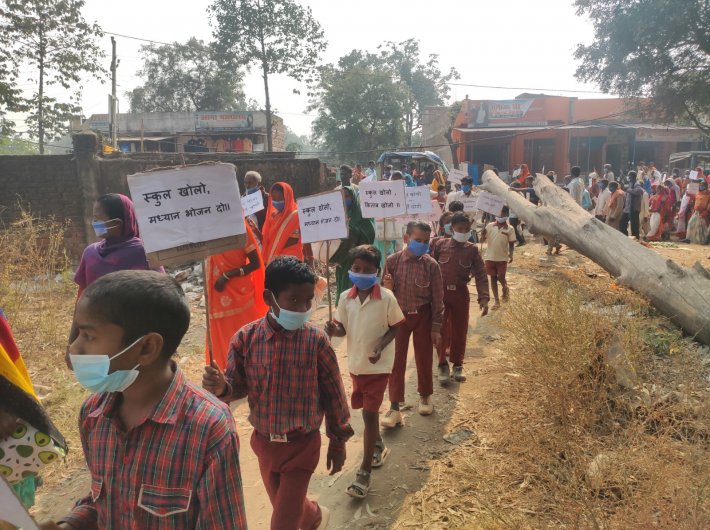With parents, they take out a rally to press for resuming schooling, mid-day meals
On Human Rights day, hundreds of children and their parents took out a demonstration rally to the Block office in Manika of Latehar district to protest against the continued closure of primary schools in Jharkhand.
The rally was convened by Gram Swaraj Mazdoor Sangh (GSMS), a local organisation of rural workers.
Primary schools have been closed in Jharkhand for almost two years. The government expects online study to fill the gap, but in areas like Manika very few children can study online. During the village-to-village campaign that preceded the rally, GSMS volunteers found that most children in the primary-level age group are unable to read a simple sentence. This is consistent with the findings of the School Children’s Online and Offline Learning (‘SCHOOL’) survey conducted in 15 states earlier this year: the survey found that, among poor rural families, only 25% of children enrolled in Class 3 were able to read a simple sentence.
Mothers and fathers in Manika feel angry and helpless. Most of them cannot afford private tuitions for their children. They want schools to reopen as soon as possible. “If crowds are allowed in markets, marriage parties and even cricket stadiums, when why are schools closed,” some of them point out, according to a GSMS press release.
On the same day, a huge crowd was allowed to attend a meeting addressed by Chief Minister Hemant Soren in Daltonganj, just an hour from Manika. A few weeks earlier, 40,000 people were allowed to crowd a stadium in Ranchi for the India-New Zealand cricket match.
Participants also brought up other instances of human rights violations in Manika. In Bishunbandh village, there have been two recent incidents of rape, including the rape of a minor girl. In Sadwadih, villagers are opposing an illegal stone mine that causes blast damage to their houses and endangers their children. In Kutmu, farmers are being threatened with eviction from their ancestral fields after the Forest Department bought the land from an absentee zamindar who should not be in possession of it in the first place.
Mahavir, who has been organizing Parhaiya (a Particularly Vulnerable Tribal Group) families in the area for many years, gave a spirited speech on self-governance. In his own village, Parhaiya families have broken the shackles of bonded labour and become self-reliant farmers. “The land, forest, pongs and other local resources are ours, he said, we will not let anyone snatch them from us.” He also castigated the police for failing to act on people’s complaints. “The police thana is ours”, he said, “if they don’t listen to us we will gherao them.” On a similar line, Shyama Singh, mukhiya of Namudag, complained that gram sabha resolutions were ignored by the bureaucracy.
James Herenj, coordinator of NREGA Watch Jharkhand, explained the value of workers’ organizations to the audience. “Landlords, contractors, dealers and middlemen keep trying to undermine our rights, he said, but together we can resist.”
Many participants spoke in their own words about the injustice of schools being closed for so long: “Our children’s future is being ruined. If our children remain illiterate, they will have no choice but to earn a living from hard work in the brick kilns … We cannot afford private tuitions. Even 10-year-old children have forgotten their A, B, C.”
Somwati Devi, from Sadhwadih village and member of GSMS, summed up the sentiment of the audience when she said: “This is a plot against poor people. Big people want us to remain illiterate so that we continue to work for a pittance in their fields and houses.”
